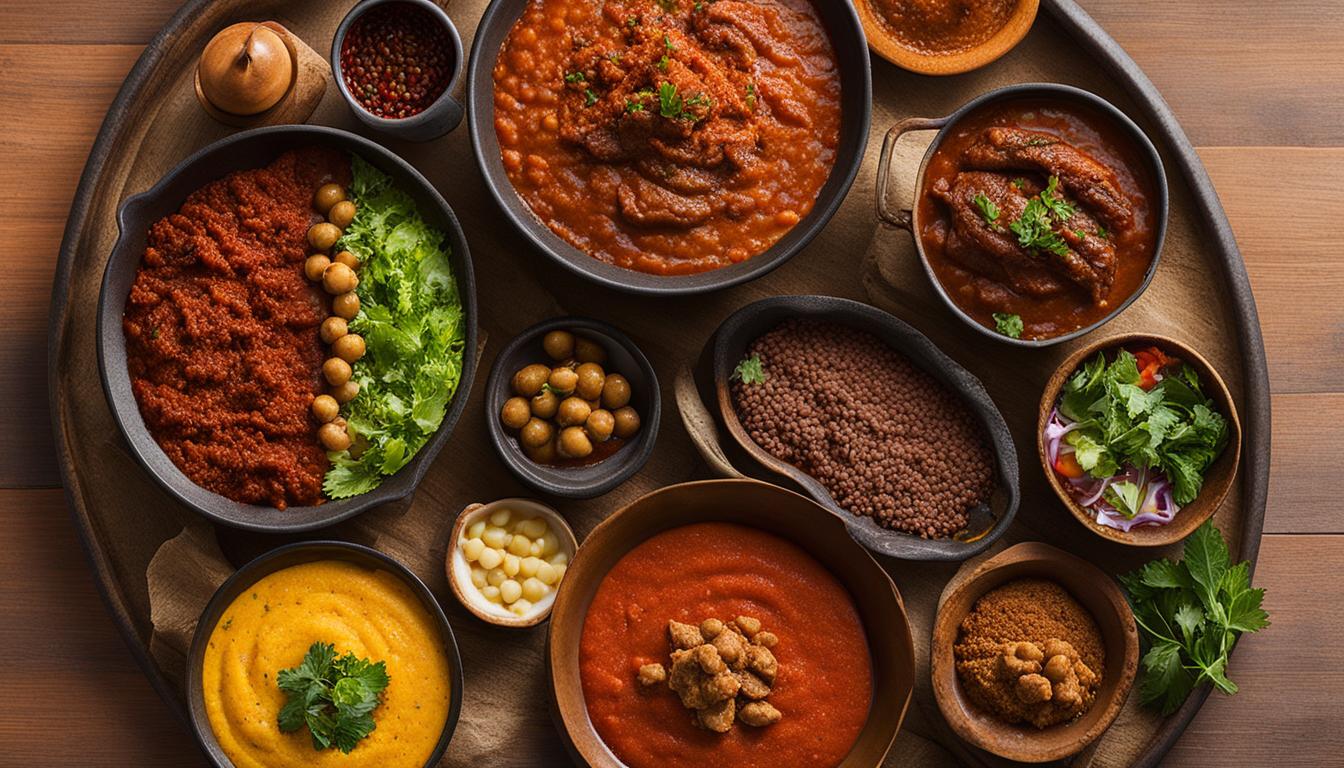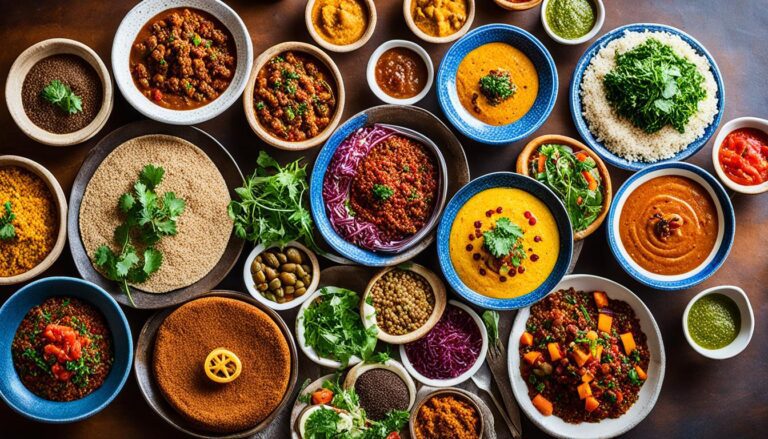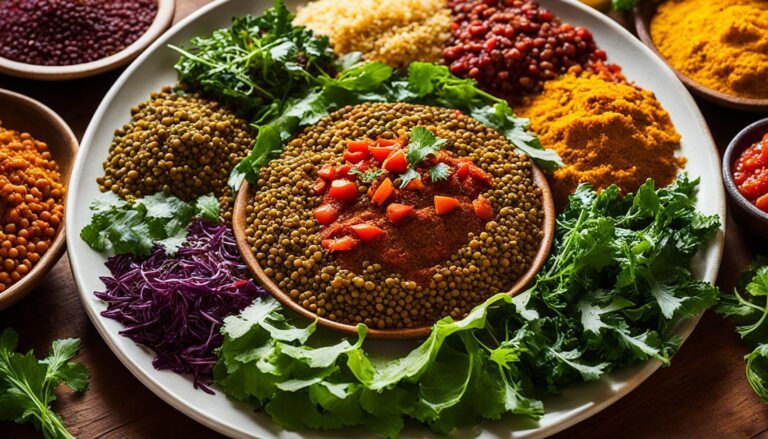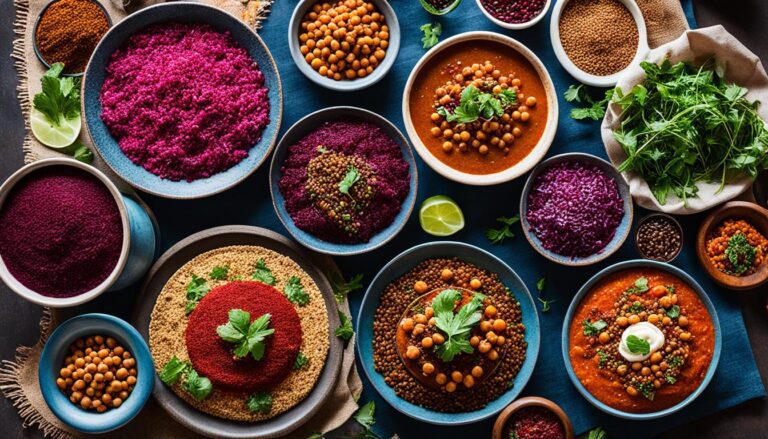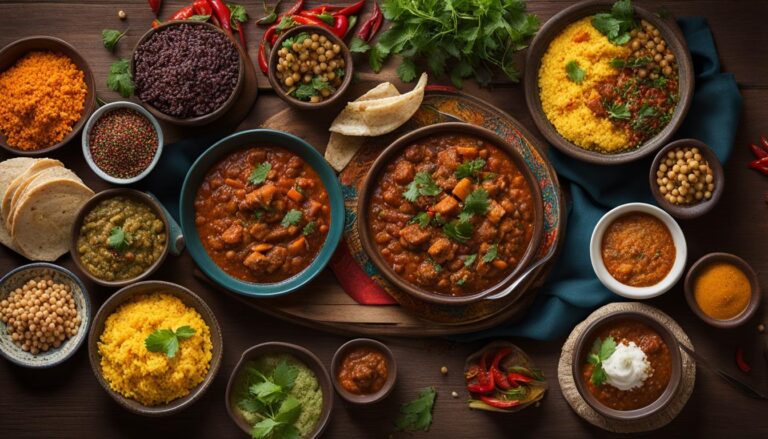Is Ethiopian Food Halal?
Welcome to our exploration of Ethiopian cuisine and the question that often arises: Is Ethiopian food halal? Join us as we dig deep into the flavors, ingredients, and preparation methods of Ethiopian dishes to uncover whether they align with halal dietary requirements. Prepare to embark on a tantalizing journey through the rich flavors and unique traditions of Ethiopian cuisine.
Key Takeaways:
- Ethiopian cuisine is known for its diverse flavors and unique traditions.
- The halal status of Ethiopian food depends on the ingredients and preparation methods used.
- Halal certification in Ethiopian restaurants provides assurance to Muslim diners.
- There are alternative halal options available within Ethiopian cuisine, such as vegetarian dishes.
- Stay with us as we uncover whether Ethiopian food is halal and explore the intricacies of this vibrant culinary culture.
Understanding Halal Food
Before we delve into the specifics of Ethiopian cuisine, it’s essential to have a clear understanding of what halal food entails. Halal food refers to food that adheres to Islamic dietary laws, as outlined in the Quran. These dietary laws define the permissible and prohibited foods for Muslims. The consumption of halal food is an important aspect of practicing Islam and is followed by millions of Muslims around the world.
Islamic dietary laws emphasize purity and adherence to specific guidelines in food production, preparation, and consumption. Halal meat, in particular, plays a crucial role in this context. Halal meat refers to meat from animals that have been slaughtered following strict Islamic guidelines. The primary requirements for meat to be considered halal include the use of a sharp knife to swiftly sever the animal’s throat, the recitation of the name of Allah at the time of slaughter, and the draining of all blood from the animal’s body.
The use of halal meat in Ethiopian cuisine is important for Muslim diners who adhere to halal dietary principles. It provides assurance that the meat used in the preparation of Ethiopian dishes has been sourced and prepared according to Islamic guidelines, making it permissible for consumption.
Exploring Ethiopian Cuisine
Ethiopian cuisine is a culinary journey full of vibrant flavors and rich traditions. From the aromatic spices to the unique cooking techniques, Ethiopian food offers a truly memorable dining experience. At the heart of it all are the traditional dishes that showcase the country’s diverse culinary heritage.
One of the most iconic elements of Ethiopian cuisine is injera, a sourdough flatbread that serves as the foundation for many meals. Made from fermented teff flour, injera is not only delicious but also plays a significant role in Ethiopian culture and social gatherings. It serves as a utensil and is used to scoop up various stews, ensuring every bite is a combination of flavors and textures.
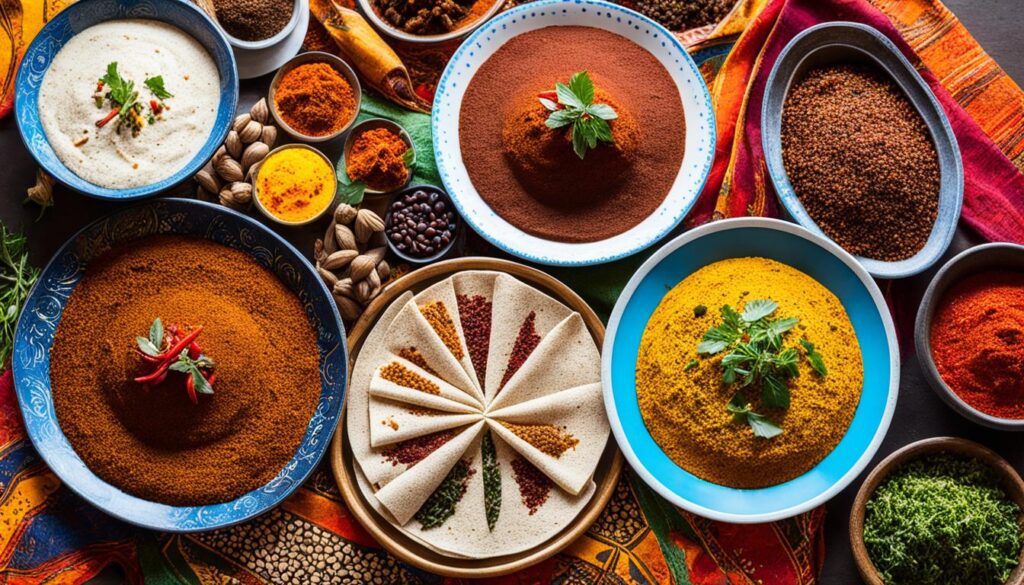
Another key ingredient in Ethiopian cuisine is berbere spice. This aromatic blend combines chili peppers, garlic, ginger, and various other spices, creating a complex flavor profile that adds warmth and depth to dishes. Berbere spice is the cornerstone of many Ethiopian recipes, including stews, lentil dishes, and even spice rubs.
The Diversity of Traditional Dishes
When exploring Ethiopian cuisine, you’ll find a wide array of traditional dishes that showcase the country’s culinary diversity. From Doro Wat, a flavorful chicken stew simmered in berbere spice, to Kitfo, a spiced minced meat dish, each dish tells a unique story and carries a distinct taste.
Vegetarians and vegans also have a variety of options in Ethiopian cuisine. Dishes like Shiro, made with ground chickpeas or lentils, and Atkilt Wat, a spiced vegetable stew, provide flavorful alternatives that highlight the diversity of the cuisine.
Whether you’re enjoying a communal meal at a traditional Ethiopian restaurant or exploring the flavors at home, Ethiopian cuisine offers a taste of tradition and a culinary adventure like no other. From injera to berbere spice, every bite is a celebration of the rich heritage that defines Ethiopian food.
Ethiopian Food Preparation Methods
Ethiopian cuisine is renowned for its distinct cooking techniques and methods that contribute to the unique flavors and aromas of the dishes. In this section, we’ll explore the traditional cooking practices that are integral to Ethiopian food preparation.
Slow-Cooking and Stewing
In Ethiopian cooking, slow-cooking and stewing are essential methods that result in rich and flavorful dishes. Slow cooking allows the flavors to develop gradually, resulting in tender meats and well-infused spices. Stews, known as wats, are a staple in Ethiopian cuisine and are made by simmering meat, vegetables, and aromatic spices for hours. This slow and gentle cooking process brings out the depth of flavors, creating dishes that are full-bodied and satisfying.
Vegetarian Options in Ethiopian Cuisine
Ethiopian cuisine offers a variety of vegetarian options, making it a delight for those following a plant-based diet. Lentils, legumes, and various vegetables are commonly used to create delicious and hearty vegetarian dishes. One of the most popular vegetarian dishes is Misir Wat, a spicy red lentil stew, bursting with flavors of berbere spice and served with injera, a sourdough flatbread. Additionally, a selection of vegetable-based stews, salads, and side dishes provide ample choices for vegetarians in Ethiopian cuisine.
Whether you’re a meat lover or a vegetarian, Ethiopian food offers a diverse range of flavors and cooking techniques that cater to different dietary preferences.

Ingredients in Ethiopian Food
When it comes to determining whether Ethiopian food is halal, understanding the ingredients used is essential. In Ethiopian cuisine, a variety of ingredients come together to create the unique flavors and textures that are characteristic of this culinary tradition.
Meat Sources: Ethiopian cuisine incorporates various meat sources, including beef, chicken, lamb, and goat. The meat is often stewed or slow-cooked to infuse it with rich flavors and tenderness.
Spices and Herbs: Ethiopian food is renowned for its vibrant and aromatic spices. One of the key spice blends used is berbere, a mixture of chili peppers, garlic, ginger, fenugreek, and other spices. Other commonly used spices include turmeric, cumin, cardamom, and cinnamon.
Legumes and Grains: Legumes and grains play a significant role in Ethiopian cuisine. Lentils, chickpeas, and split peas are often incorporated into various dishes, providing a hearty and protein-rich element. Injera, a sourdough flatbread made from fermented teff flour, is a staple accompaniment to many Ethiopian meals.
To visualize the variety of ingredients in Ethiopian food, take a look at the image below:
By examining the sources of meat, the types of spices and herbs, and the inclusion of legumes and grains, we can gain a deeper understanding of the ingredients used in Ethiopian cuisine. In the next section, we’ll explore the halal certification of Ethiopian restaurants and its significance for Muslim diners.
Halal Certification in Ethiopian Restaurants
Many Muslim diners value the assurance of halal-certified options when dining out. This extends to Ethiopian cuisine, which has gained popularity in the United States for its unique flavors and cultural experience. In this section, we’ll explore the availability of halal-certified Ethiopian restaurants, catering specifically to Muslim diners looking for halal food options.
Ethiopian restaurants that obtain halal certification undergo a rigorous process to ensure their compliance with Islamic dietary laws. This certification guarantees that the ingredients used, as well as the preparation and cooking methods employed, align with halal guidelines. For Muslim diners, dining at a halal-certified Ethiopian restaurant provides confidence and peace of mind.
Halal certification plays a crucial role in meeting the needs of Muslim diners who seek to indulge in the vibrant flavors of Ethiopian cuisine. It recognizes the importance of religious dietary requirements and enables Muslim diners to explore Ethiopian food without compromising their beliefs.
When searching for halal-certified Ethiopian restaurants, Muslim diners can rely on reputable halal certification bodies and organizations such as the Islamic Society of North America (ISNA) and the Halal Food Council of USA (HFC-USA). These organizations ensure that restaurants comply with halal standards and guidelines, providing Muslim diners with a list of trustworthy establishments to choose from.
By obtaining halal certification, Ethiopian restaurants demonstrate their commitment to inclusivity, catering to the diverse dietary needs of the Muslim community. Muslim diners can enjoy the vibrant flavors of Ethiopian cuisine while adhering to their halal dietary requirements, fostering a positive dining experience for all.
Halal Alternatives in Ethiopian Food
For those who prefer strictly halal options, we understand the importance of finding suitable alternatives within Ethiopian cuisine. Whether you’re a vegetarian looking for plant-based options or a seafood lover seeking halal seafood dishes, Ethiopian food offers a variety of choices that cater to these preferences.
Ethiopian cuisine is known for its diverse range of vegetarian dishes, making it an excellent option for those looking for halal alternatives. From lentils and chickpeas to flavorful vegetable stews, you’ll find an abundance of vegetarian Ethiopian food options to satisfy your halal diet.
In addition to vegetarian options, Ethiopian cuisine offers seafood dishes that may appeal to diners seeking halal alternatives. While meat is widely consumed in Ethiopian cuisine, seafood options such as fish and prawns are also available in some Ethiopian restaurants, providing a halal alternative for seafood enthusiasts.
Experience the Rich Flavors
Vegetarian Ethiopian food and seafood options are not only halal alternatives but also offer unique and vibrant flavors that will tantalize your taste buds. Made with a variety of aromatic spices and herbs, these dishes showcase the rich cultural heritage of Ethiopian cuisine.
So whether you’re choosing vegetarian Ethiopian food or exploring the seafood options, you can enjoy the diversity, flavors, and halal alternatives that Ethiopian cuisine has to offer.
Conclusion
After thoroughly examining Ethiopian cuisine, its traditions, ingredients, preparation methods, and the availability of halal-certified Ethiopian restaurants in the United States, we have reached a conclusion on whether Ethiopian food satisfies halal dietary requirements.
With its emphasis on flavor, freshness, and unique spices, Ethiopian food offers a diverse culinary experience. The cuisine showcases a wide variety of dishes that predominantly use halal ingredients such as lamb, beef, chicken, and vegetables. The traditional cooking methods, including slow-cooking and stewing, enhance the flavors while ensuring the adherence to halal standards.
Furthermore, many Ethiopian restaurants in the United States now offer halal-certified options, catering to Muslim diners seeking halal food choices. This certification provides assurance to those looking for halal dishes. Additionally, for those who prefer strictly halal alternatives, vegetarian Ethiopian food options and seafood dishes can be found.
In conclusion, Ethiopian food can indeed be considered halal, meeting the dietary requirements of Muslim diners in the United States. With its rich tradition, diverse flavors, and availability of halal-certified options, Ethiopian cuisine presents a delightful culinary journey that can satisfy both the taste buds and religious preferences.

